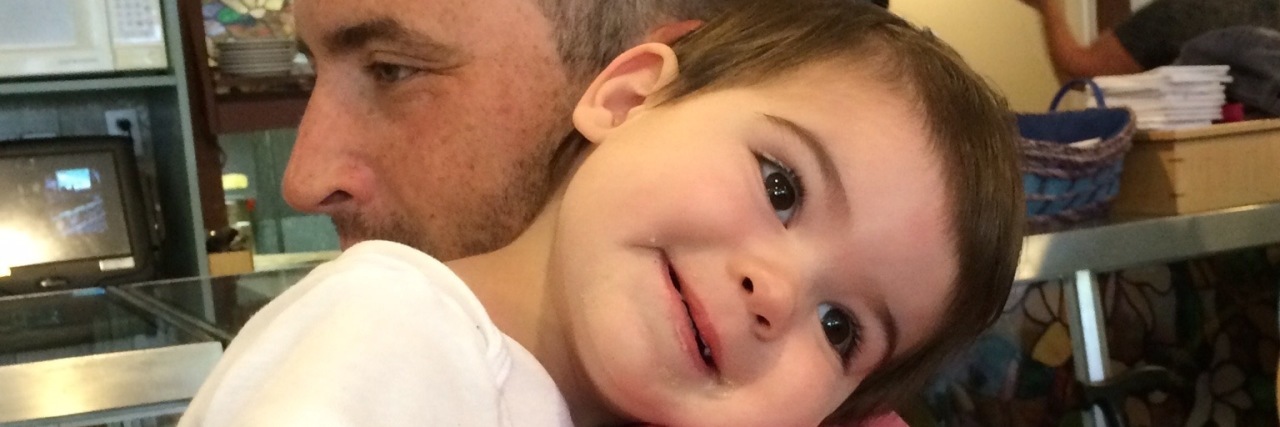What It's Like to Worry for Your Child's Safety With a Rare Disease
Keeping our kids safe is every parent’s number one job. Even as an adult I associate protection and safety with my childhood home and my loving parents. It’s a great relief when our children finally learn where to go and who to find when they’re in danger. More than a relief, it’s a proud parental achievement worth celebrating: “We’re super parents! Our kids know where to go when they sense danger!” Mission accomplished — big exhale.
When your kid has a rare neurodegenerative disease causing her balance to worsen every day, the safety of your home is constantly being put to the test. There is no relief, there is no deep exhale. There is only constant heartache with every face-first fall into the brick wall that she once used to pull herself up.
When Susannah was a baby she would flop onto my shoulder and rest quietly for minutes at a time – it was heaven. I live for those shoulder flops. Just after her second birthday we were told this spontaneous cuddling was a symptom of her genetic condition that would eventually cause her to fall – a lot.
Around the time of her diagnosis, we learned that our daughter’s seemingly intentional maneuver of affection was just another implication of her increasingly low muscle tone, or hypotonia. As she grows taller and her gait becomes severely ataxic, constant tumbles are a regular part of our new normal. Her daily bumps and bruises resemble those of a hockey player.
I’m the luckiest guy in the world, for so many reasons. I’m blessed to have a thoughtful, funny, intelligent and kind daughter. The progressive nature of Susannah’s disease might steal away her speech and steps, but she will never lose the sincere and purposeful kindness that is cause for those quiet shoulder flops. I have complete faith in science; however, there are two things I am certain medicine has wrong: that there is no cure for Susannah’s condition, and that those divine shoulder flops have a clinical explanation like “low muscle tone.” She flops onto my shoulder because she loves me. She’s safe there, and she knows it.
This morning, one of Susannah’s daily acts of kindness warmed my soul to the core. I was about to walk out the front door when she extended her hand and led me into the bedroom. When we arrived at her bed, she flopped herself onto the mattress and said my favorite words, “Daddy cuddle me.” Before the tears made it from the pit of my stomach up to my eyes, she pulled me onto the bed and we cuddled. One of the best cuddles ever.
After a few minutes Susannah rolled over and said “Daddy, I come to bed because it’s safe.” Crushing. The tears returned to the pit of my stomach and became a nauseating feeling of paternal helplessness. Is her bed the only place in our home where she won’t fall and get injured? We haven’t taught Susannah where to go when she feels danger, her disease has. Does she only feel safe in the bottom level of a New York City-sized bunk bed designed to keep her from falling out at night?
There’s no great parental achievement here, no deep exhale celebrating the accomplishment of that essential hurdle: teaching our kids where to go when they’re scared. That badge of honor doesn’t belong to us because we didn’t earn it, her degenerative condition did. When she’s having an especially wobbly day, Susannah knows she immediately needs to return to her bed, or into my arms. The labyrinth of our living room and its old, uneven New York floors is overwhelming.
No matter how relentless we are about making our home accessible, Susannah’s movement disorder is responsible for teaching her where to go when she feels the danger of her changing coordination. I’m thankful to her disease for that — for doing my job in some strange way. For somehow teaching her to be safe. But I’d like to meet KIF1A in a dark alley and destroy that monster for stealing away our daughter’s sense of independence.
It’s natural, as kids get older, for those precious extended hugs to become less frequent. That’s one of the deliciously sad parts about watching our children grow up. Not with Susannah. Her rare disease is cause for one of my most coveted parts of the day. Selfish, for sure, but if Susannah flops into my arms and rests her head on my shoulder because of a rare genetic anomaly, I’ll accept that. But that’s not the reason. You see, my daughter is a trickster. The real reason she leads me into her bed for a safe cuddle is because she inherited her mother’s beautiful tenderness. She’s more generous than she is cautious. She knows how amazing it makes me feel when she flops on my shoulder. Susannah is a superhero who can fly around the room — and I thank her every single day for deciding to land on my shoulder. And for staying there.
We want to hear your story. Become a Mighty contributor here.

